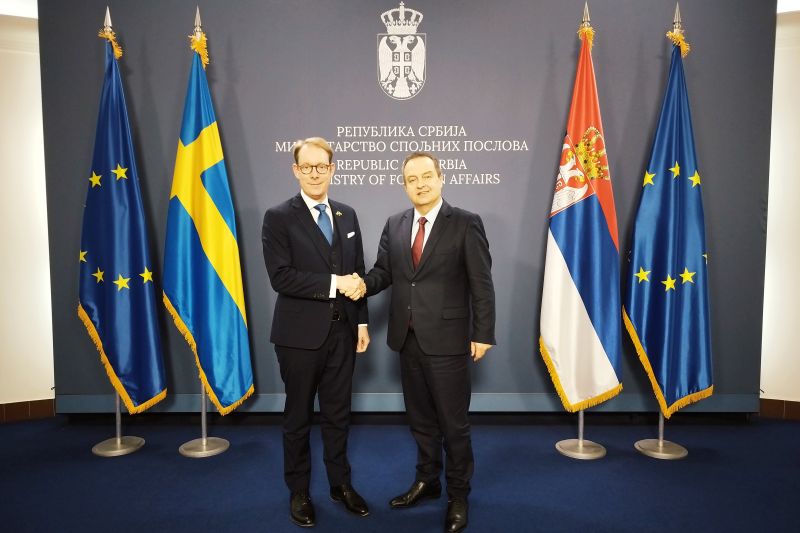First Deputy Prime Minister and Minister of Foreign Affairs Ivica Dacic stated today, at a joint press conference with Minister for Foreign Affairs of the Kingdom of Sweden Tobias Billström, that it is Serbia’s wish to develop better bilateral relations with this country.
- Serbia
Get to know Serbia
- Citizens
Culture and science
Health services
Pension and disability insurance
- Business
Employment
Economy
- Media
- Government
- Contact
Keep in touch
Keepin touch
Whether you have a question, comment, suggestion or any problem in the purview of the government, send us your message and we will try to respond as soon as possible. If your problem is not in our purview, we will forward your message to the relevant institution.
Economic, political relations of Serbia, Sweden on the rise
Assessing that the two countries have very good political relations, Dacic said that an agreement was reached to hold bilateral meetings of the ministers of foreign affairs every year and that this should be a constant incentive for the further development of our relations.
Serbia is very proud of the fact that the two countries have better and better economic relations and cooperation, he said, and in that context expressed his gratitude to Sweden for the incentive funds that we received from that country in the previous period for various development projects.
He also stated that approximately 130,000 citizens of Serbia live in Sweden, who can be a link between our two countries.
When it comes to the dialogue on Kosovo and Metohija, Dacic reiterated that Serbia is asking for the formation of the Community of Serb Municipalities to be the first step, a decisive and determining condition for the implementation of the European proposal for the normalisation of relations between Belgrade and Pristina.
Today is 10 years since the signing of the Brussels Agreement, which I signed then as Prime Minister of Serbia and in which the formation of the Community of Serb Municipalities was agreed for the first time. Ten years later, what was the first point in the Brussels Agreement, i.e. the formation of the Community of Serb Municipalities, is under a big question mark, said the First Deputy Prime Minister.
What is indisputable is that we will continue with reforms for EU membership. I think it is in Serbia's interest to apply EU standards when it comes to human rights, freedoms, democracy, reforms in various areas of society, including the system of the rule of law, media freedom and others, said Dacic.
Billström pointed out that the welcome he received in Belgrade is a reflection of the strong ties between Serbia and Sweden.
He reiterated that he discussed with Dacic the negotiation process between Belgrade and Pristina, the European proposal for the normalisation of relations, as well as a series of other bilateral issues, including economic ones.
-
 Belgrade/Tashkent, 21 February 2026
Belgrade/Tashkent, 21 February 2026Connecting economies, businesspeople of Serbia, Uzbekistan
-
 Belgrade/Tashkent, 20 February 2026
Belgrade/Tashkent, 20 February 2026Bolstering trade with Uzbekistan
-
 Belgrade/Tashkent, 19 February 2026
Belgrade/Tashkent, 19 February 2026Deepening economic relations with Uzbekistan
-
 Belgrade, 19 February 2026
Belgrade, 19 February 2026Continued cooperation with Russia in fight against crime
-
 Belgrade/Athens, 17 February 2026
Belgrade/Athens, 17 February 2026Further development of cooperation with Greece in combating irregular migration
-
 Belgrade/Athens, 17 February 2026
Belgrade/Athens, 17 February 2026Continued strengthening of cooperation with Greece in field of civil protection
-
 Belgrade/Athens, 17 February 2026
Belgrade/Athens, 17 February 2026Friendly relations between Serbia, Greece based on strong historical ties
-
 Belgrade/Athens, 16 February 2026
Belgrade/Athens, 16 February 2026Improving cooperation with Greece in areas of common interest
-
 Belgrade, 11 February 2026
Belgrade, 11 February 2026Burger King plans to expand operations to Serbia
-
 Belgrade, 5 February 2026
Belgrade, 5 February 2026Serbia attaches great importance to work of UNMIK

